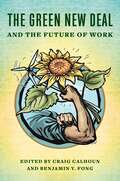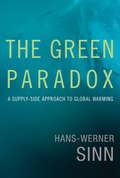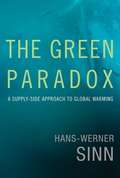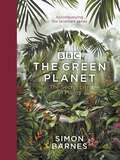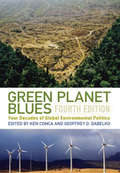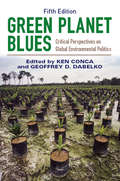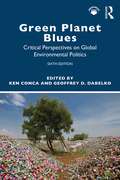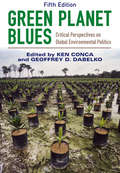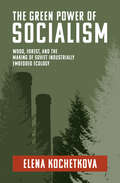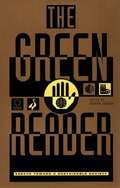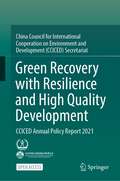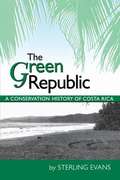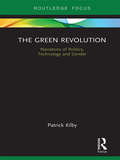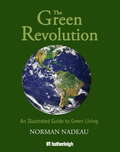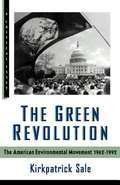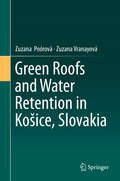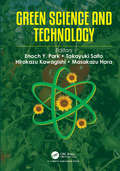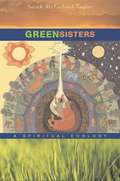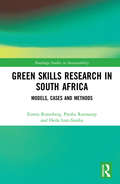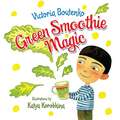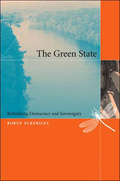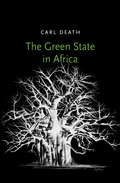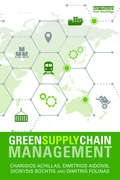- Table View
- List View
The Green New Deal and the Future of Work
by Richard A. Walker Hillary Angelo Raj Patel Jim Goodman Alyssa Battistoni Stephanie Luce Wilson Sherwin Dustin Guastella Mindy Isser Todd E. Vachon Harvey Molotch Daniel Aldana Cohen J. Mijin Cha Lara Skinner Clark A. Miller Olúfẹ́mi O. Táíwò Harry C. Boyte Trygve Throntveit Richard LachmannCatastrophic climate change overshadows the present and the future. Wrenching economic transformations have devastated workers and hollowed out communities. However, those fighting for jobs and those fighting for the planet have often been at odds. Does the world face two separate crises, environmental and economic? The promise of the Green New Deal is to tackle the threat of climate change through the empowerment of working people and the strengthening of democracy. In this view, the crisis of nature and the crisis of work must be addressed together—or they will not be addressed at all.This book brings together leading experts to explore the possibilities of the Green New Deal, emphasizing the future of work. Together, they examine transformations that are already underway and put forth bold new proposals that can provide jobs while reducing carbon consumption—building a world that is sustainable both economically and ecologically. Contributors also debate urgent questions: What is the value of a federal jobs program, or even a jobs guarantee? How do we alleviate the miseries and precarity of work? In key economic sectors, including energy, transportation, housing, agriculture, and care work, what kind of work is needed today? How does the New Deal provide guidance in addressing these questions, and how can a Green New Deal revive democracy? Above all, this book shows, the Green New Deal offers hope for a better tomorrow—but only if it accounts for work’s past transformations and shapes its future.
The Green Paradox: A Supply-Side Approach to Global Warming
by Hans-Werner SinnA leading economist develops a supply-side approach to fighting climate change that encourages resource owners to leave more of their fossil carbon underground.The Earth is getting warmer. Yet, as Hans-Werner Sinn points out in this provocative book, the dominant policy approach—which aims to curb consumption of fossil energy—has been ineffective. Despite policy makers' efforts to promote alternative energy, impose emission controls on cars, and enforce tough energy-efficiency standards for buildings, the relentlessly rising curve of CO2 output does not show the slightest downward turn. Some proposed solutions are downright harmful: cultivating crops to make biofuels not only contributes to global warming but also uses resources that should be devoted to feeding the world's hungry. In The Green Paradox, Sinn proposes a new, more pragmatic approach based not on regulating the demand for fossil fuels but on controlling the supply.The owners of carbon resources, Sinn explains, are pre-empting future regulation by accelerating the production of fossil energy while they can. This is the “Green Paradox”: expected future reduction in carbon consumption has the effect of accelerating climate change. Sinn suggests a supply-side solution: inducing the owners of carbon resources to leave more of their wealth underground. He proposes the swift introduction of a “Super-Kyoto” system—gathering all consumer countries into a cartel by means of a worldwide, coordinated cap-and-trade system supported by the levying of source taxes on capital income—to spoil the resource owners' appetite for financial assets.Only if we can shift our focus from local demand to worldwide supply policies for reducing carbon emissions, Sinn argues, will we have a chance of staving off climate disaster.
The Green Paradox
by Hans-Werner SinnThe Earth is getting warmer. Yet, as Hans-Werner Sinn points out in this provocative book, the dominant policy approach--which aims to curb consumption of fossil energy--has been ineffective. Despite policy makers' efforts to promote alternative energy, impose emission controls on cars, and enforce tough energy-efficiency standards for buildings, the relentlessly rising curve of CO2 output does not show the slightest downward turn. Some proposed solutions are downright harmful: cultivating crops to make biofuels not only contributes to global warming but also uses resources that should be devoted to feeding the world's hungry. In The Green Paradox, Sinn proposes a new, more pragmatic approach based not on regulating the demand for fossil fuels but on controlling the supply. The owners of carbon resources, Sinn explains, are pre-empting future regulation by accelerating the production of fossil energy while they can. This is the "Green Paradox": expected future reduction in carbon consumption has the effect of accelerating climate change. Sinn suggests a supply-side solution: inducing the owners of carbon resources to leave more of their wealth underground. He proposes the swift introduction of a "Super-Kyoto" system--gathering all consumer countries into a cartel by means of a worldwide, coordinated cap-and-trade system supported by the levying of source taxes on capital income--to spoil the resource owners' appetite for financial assets. Only if we can shift our focus from local demand to worldwide supply policies for reducing carbon emissions, Sinn argues, will we have a chance of staving off climate disaster.
The Green Pharmacy Herbal Handbook
by James O. DukeIn this handy companion to his best-selling book The Green Pharmacy, leading herbal authority James A. Duke, Ph.D.., delivers the lowdown on virtually every healing herb available in today's marketplace: its description and history, therapeutic uses, medicinal properties, prescription counterparts, dosage options, safety and effectiveness rating, and precautions. Dr. Duke's inimitable folksy tone and friendly manner shine throughout The Green Pharmacy Herbal Handbook, making it as entertaining to read as it is practical. The most thorough,and comprehensive herb reference of its kind, the handbook was culled from the thousands of entries in Dr. Duke's database of the world's medicinal plants. The database, which he began during his career as a top botanist with the USDA, is a lifelong project for Dr. Duke and has become a major reference resource for herbalists worldwide.
The Green Planet: (ACCOMPANIES THE BBC SERIES PRESENTED BY DAVID ATTENBOROUGH)
by Simon BarnesPraise for The Green Planet (BBC One)'David Attenborough's gobsmacking, awe-inspiring return' The Guardian'The Green Planet reveals the secret lives of plants in the same way The Blue Planet opened our eyes to the oceans' New ScientistThere's something new under the sunPlants live secret, unseen lives - hidden in their magical world and on their timescale. From the richest jungles to the harshest deserts, from the snowiest alpine forest to the remotest steaming swamp, Green Planet travels from one great habitat to the next, showing us that plants are as aggressive, competitive and dramatic as the animals on our planet. You will discover agents of death, who ruthlessly engulf their host plant, but also those that form deep and complex relationships with other species, such as the desert cacti who use nectar-loving bats to pollinate. Although plants are undoubtedly the stars of the show, a fascinating new light will be shed on the animals that interact with them.Using the latest technologies and showcasing over two decades of new discoveries, Green Planet reveals the strange and wonderful life of plants like never before - a life full of remarkable behaviour, emotional stories and surprising heroes.
Green Planet Blues: Critical Perspectives on Global Environmental Politic
by Ken Conca Geoffrey D. DabelkoRevised and updated throughout, this unique anthology examines global environmental politics from a range of perspectives: contemporary and classic, activist and scholarly, and reflecting voices of the powerless and powerful. Paradigms of sustainability, environmental security, and ecological justice illustrate the many ways environmental problems and their solutions are framed in contemporary international debates about climate, water, forests, toxics, energy, food, biodiversity, and other environmental challenges of the twenty-first century. Organized thematically, the selections offer a truly global scope. Fourteen new readings discuss globalization and environmental change; transnational activist networks; the UN Environment Programme; environment-conflict linkages, including the case of Darfur; environmental peacebuilding; the debate on greening foreign aid; and the linkages between climate change and human rights. This book stresses the underlying questions of power, interests, authority, and legitimacy that shape environmental debates, and it provides readers with a global range of perspectives on the critical challenges facing the planet and its people.
Green Planet Blues: Critical Perspectives on Global Environmental Politics (5th Edition)
by Ken Conca Geoffrey D. Dabelko<p>Revised and updated throughout, this unique anthology examines global environmental politics from a range of perspectives (contemporary and classic, activist and scholarly) and reflects voices of the powerless and powerful. Paradigms of sustainability, environmental security, and ecological justice illustrate the many ways environmental problems and their solutions are framed in contemporary international debates about climate, water, forests, toxics, energy, food, biodiversity, and other environmental challenges of the twenty-first century. Organized thematically, the selections offer a truly global scope. Seventeen new readings discuss climate justice, environmental peacebuilding, globalization, land grabs, corporate environmentalism, climate adaptation, gender, disaster risk, resilience, and the future of global environmental politics in the wake of the 'Rio+20' global summit of 2012. <p>This book stresses the underlying questions of power, interests, authority, and legitimacy that shape environmental debates, and it provides readers with a global range of perspectives on the critical challenges facing the planet and its people.</p>
Green Planet Blues: Critical Perspectives on Global Environmental Politics
by Ken Conca Geoffrey D. DabelkoRevised and updated throughout, this unique anthology examines global environmental politics from a range of perspectives and captures the voices of both the powerless and the powerful. Paradigms of sustainability, environmental security, and ecological justice illustrate the many ways environmental challenges and their solutions are framed in contemporary international debates about climate, water, forests, toxics, energy, food, and biodiversity. Organized thematically, the selections offer a truly global scope. Seventeen new readings explore climate justice, globalization, land and water grabs, climate change and conflict, China’s international environmental relations, and the future of climate politics in the wake of the Paris Agreement. This book stresses the underlying questions of power, interests, authority, and legitimacy that shape environmental debates, and it provides readers with a global range of perspectives on the critical challenges facing the planet and its people. This new edition of Green Planet Blues connects directly with a wide-range of upper-level undergraduate and graduate-level courses.
Green Planet Blues
by Geoffrey D. Dabelko Edited by Ken ConcaRevised and updated throughout, this unique anthology examines global environmental politics from a range of perspectives#151;contemporary and classic, activist and scholarly#151;and reflects voices of the powerless and powerful. Paradigms of sustainability, environmental security, and ecological justice illustrate the many ways environmental problems and their solutions are framed in contemporary international debates about climate, water, forests, toxics, energy, food, biodiversity, and other environmental challenges of the twenty-first century. Organized thematically, the selections offer a truly global scope. Seventeen new readings discuss climate justice, environmental peacebuilding, globalization, land grabs, corporate environmentalism, climate adaptation, gender, disaster risk, resilience, and the future of global environmental politics in the wake of the #147;Rio+20” global summit of 2012. This book stresses the underlying questions of power, interests, authority, and legitimacy that shape environmental debates, and it provides readers with a global range of perspectives on the critical challenges facing the planet and its people.
Green Planet Blues
by Geoffrey D. Dabelko Edited by Ken ConcaRevised and updated throughout, this unique anthology examines global environmental politics from a range of perspectives#151;contemporary and classic, activist and scholarly#151;and reflects voices of the powerless and powerful. Paradigms of sustainability, environmental security, and ecological justice illustrate the many ways environmental problems and their solutions are framed in contemporary international debates about climate, water, forests, toxics, energy, food, biodiversity, and other environmental challenges of the twenty-first century. Organized thematically, the selections offer a truly global scope. Seventeen new readings discuss climate justice, environmental peacebuilding, globalization, land grabs, corporate environmentalism, climate adaptation, gender, disaster risk, resilience, and the future of global environmental politics in the wake of the #147;Rio+20” global summit of 2012. This book stresses the underlying questions of power, interests, authority, and legitimacy that shape environmental debates, and it provides readers with a global range of perspectives on the critical challenges facing the planet and its people.
The Green Power of Socialism: Wood, Forest, and the Making of Soviet Industrially Embedded Ecology (History for a Sustainable Future)
by Elena KochetkovaHow the Soviet forestry industry developed a unique form of industrial ecology—a commonsense approach toward natural resources for the economy and society.In The Green Power of Socialism, Elena Kochetkova examines the relationship between nature and humans under state socialism by looking at the industrial role of Soviet forests. The book explores evolving Soviet policies of wood consumption, discussing how professionals working in the forestry industry of the Soviet state viewed the present and future of forests by considering them both a natural resource and a trove of industrial material. When faced with the prospect of wood shortages, these specialists came to develop new industry-ecology paradigms. Kochetkova looks at the materiality of Soviet industry through forests and wood to show how, paradoxically, industrial ecology emerged and developed as a by-product of the Soviet industrialization project.The Green Power of Socialism also discusses how post-Soviet industry has abandoned these socialist practices and the idea of nature as a complicated ecosystem that provides a crucial service to society. Emphasizing the technological and environmental impacts of the Cold War, Kochetkova critically reconsiders two explanatory models that have become dominant in the historiography of Soviet approaches to nature over the last decades—ecocide and environmentalism. Within the context of the current environmental crisis, the book invites readers to reevaluate state socialism as a complex phenomenon with sophisticated interactions between nature and industry. In so doing, it contributes a fresh perspective on the activities of socialist experts and their view of nature, shedding light on Soviet state industrial and environmental policy and its continuing legacy in the present day.
The Green Reader: Essays Toward a Sustainable Society
by Andrew DobsonThe Green Reader collects key source documents of today's most important social/scientific/philosophical movement-the Green movement.
Green Recovery with Resilience and High Quality Development: CCICED Annual Policy Report 2021
by CCICEDThis open access book is based on the research outputs of China Council for International Cooperation on Environment and Development (CCICED) in 2021. It covers major topics of Chinese and international attention regarding green development, such as climate, biodiversity, ocean, BRI, urbanization, sustainable production and consumption, technology, finance, value chain, and related topics. It also reviews the progress of China‘s environmental and development policies and the impacts from CCICED. This is a highly informative and carefully presented book, providing insight for policy makers in environmental issues.
The Green Republic: A Conservation History of Costa Rica
by Sterling EvansWith over 25 percent of its land set aside in national parks and other protected areas, Costa Rica is renowned worldwide as "the green republic. " In this very readable history of conservation in Costa Rica, Sterling Evans explores the establishment of the country's national park system as a response to the rapid destruction of its tropical ecosystems due to the expansion of export-related agriculture. Drawing on interviews with key players in the conservation movement, as well as archival research, Evans traces the emergence of a conservation ethic among Costa Ricans and the tangible forms it has taken. In Part I, he describes the development of the national park system and "the grand contradiction" that conservation occurred simultaneously with massive deforestation in unprotected areas. In Part II, he examines other aspects of Costa Rica's conservation experience, including the important roles played by environmental education and nongovernmental organizations, campesino and indigenous movements, ecotourism, and the work of the National Biodiversity Institute.
The Green Revolution: Narratives of Politics, Technology and Gender (Earthscan Food and Agriculture)
by Patrick KilbyThis book reviews the Green Revolution, starting with its inception and development from the 1940s to the 1970s, and leading to what is commonly referred to as a second Green Revolution in the 2000s. Building on the historical assessment, it draws insights for contemporary policy debates and demonstrates important lessons for the here and now. ‘Green Revolution’ refers to the technical measures employed to increase food (particularly grain) production, based mainly on improved seed varieties for higher yields and pest resistance. For it to be successful the Green Revolution often required land reform, investments in irrigation and fertilizer supply that were not available to women and marginal farmers. This book analyses three underlying principles that have guided green revolutions: the political environment in which they were set; how they contributed to both the successes and challenges the Green Revolution continues to face; and the systemic institutional barriers for access to these agricultural production advances, with a focus on how gender relations limit the inclusion of women even when they are the principle cultivators and farm managers. The book draws on experiences in Mexico, India and China, examining government policy, the role of the family farm, and key issues around the inclusion of women. In doing so, this book connects the history of the Green Revolution with contemporary policy debates on the developing world, particularly in relation to Africa and Asia, around foreign aid and agricultural research. It also specifically establishes that greater inclusivity for women and other marginalised farming communities will significantly enhance the effectiveness of these programs. Interlinking themes of development policy, gender, and agricultural research, this book will be of great interest to students and scholars of agricultural development, food security, and sustainable development, as well as policymakers and practitioners working in international aid and agri-food policies.
The Green Revolution
by Norman NadeauEver Wonder What A Green Renewable Sustainable World Would Look Like?With the state of our world and its limited resources, more and more people are trying to lead a greener lifestyle in order to do their part. The Green Revolution provides comprehensive information associated with adopting daily practices that will ultimately sustain, not deplete, precious natural materials in an ever-growing population.Renewable energy expert Norman Nadeau leads by example as he details how he has committed his life to living green. From the application of solar and wind turbine technology, to recovering energy embedded in places one may not expect (such as animals' manure), The Green Revolution highlights the highly sustainable system Norman Nadeau developed for his family farm.The Green Revolution serves as a broad introduction for those who want to conserve rather than squander. At this very important turning point in our planet's history, this book offers the principles by which anyone can live in the most sustainable way possible.
The Green Revolution: The American Environmental Movement (1962-1992)
by Kirkpatrick Sale Eric FonerThe Hill and Wang Critical Issues Series: concise, affordable works on pivotal topics in American history, society, and politics. The Green Revolution documents the tremendous change in public awareness and attitudes since the publication of Rachel Carson'sSilent Spring. Sale assesses the growth of national environmental organizations and the influence of scientists and their theories about global warming, the greenhouse effect, acid rain, toxic waste, and biodiversity. And he shows how environmental concerns affect all levels of society and much of our government's legislative and regulatory work.
Green Roofs and Water Retention in Košice, Slovakia
by Zuzana Poórová Zuzana VranayováThis book discusses how climate change and heat islands are a main contributor to water related problems in urban areas in Košice, Slovakia. Green roofs are used as a tool to assist in solving these water related issues. The need to provide housing in urban areas is expected to rise to 66% in 2050, according to the United Nations. Many urban areas have seen natural permeable green areas replaced with concrete constructions and hard, non-permeable surfaces. The densification of existing built-up areas is responsible for the decreasing vegetation, which results in the lack of evapotranspiration cooling the air, thereby creating urban heat islands. Several studies, discussed in this book, have shown that natural and permeable surfaces, as in the case of green roofs, can play a crucial role in mitigating this negative climate phenomenon and providing higher efficiency for buildings, leading to savings such as water, one of the focal points of this research.
Green Science and Technology
by Enoch Y. Park Takayuki Saito Hirokazu Kawagishi Masakazu HaraThis book provides a comprehensive and up-to-date review of recent trends of green science and technology. Worldwide deterioration of environment and global warming threaten our lifestyle and the survival of all creatures. In order to weather these problems, we need to construct a multidisciplinary approach involving the fusion of various advanced researches. The book begins with an overview on fundamental research about generation and utilization of renewable energy, protection of the earth's ecosystem for better coexistence with nature, development of artificial intelligence-based agriculture and molecular recognitionbased welfare and covers a wide range of innovative research on green science and technology.
Green Sisters: A Spiritual Ecology
by Sarah Mcfarland TaylorGreen Sisters gives us a firsthand understanding of the practice and experience of women whose lives bring together Catholicism and ecology, orthodoxy and activism, traditional theology and a passionate mission to save the planet. As green sisters explore ways of living a meaningful religious life in the face of increased cultural diversity and ecological crisis, their story offers hope for the future--and for a deeper understanding of the connections between women, religion, ecology, and culture.
Green Skills Research in South Africa: Models, Cases and Methods (Routledge Studies in Sustainability)
by Eureta Rosenberg Presha Ramsarup Heila Lotz-SisitkaThis book proposes transformative, realist methodology for skills research and planning through an analysis of case studies of the changing world of work, new learning pathways and educational system challenges. Studies of the green economy and sustainability transitions are a growing field internationally, however there are few books that link this interest to the development of skills. This book draws on, and showcases, the experience and insights of researcher-practitioners who are at the cutting edge in this emerging field, internationally and in South Africa. The context for this book is South Africa, but application is worldwide. In many ways indicative of the global picture, South Africa is in the grip of economic and environmental imperatives, searching for safe and just transitions. The authors present a new, embedded transitioning systems model for studying skills for a sustainable, just future. This book will be of great interest to students and scholars of sustainable development, ecological economics and skills planning.
Green Smoothie Magic
by Victoria BoutenkoVictoria Boutenko responds to the crisis of childhood obesity with a story that makes children excited about nutrition, healthy foods, vegetables and fruits, green smoothies, and the science of plants. This kids' book follows young Nic as he discovers the importance of healthy eating with a plant-rich diet and learns to invent his own healthy recipes for kids. With a pilot father and an artist mother, Nic is an inquisitive child with a fondness for magic. One day, he asks his father where trees come from and is amazed to learn they come from small acorn seeds that grow powered by the sun. His father tells him about the magical green juice, chlorophyll, in all plants. Since humans can't grow with sunlight alone and we don't make our own magical green juice, we need to eat plants to grow big and strong like the oak trees Nic is so fascinated by. Eager to grow big and strong, Nic goes home that night determined to eat more vegetables. He's quickly disheartened when he is put off by the bitter taste of lettuce. But his mother thinks of a way to ensure he can have a tasty, healthy diet. Buying a blender the next day, she whips up some raw-food green smoothie magic. Nic is hesitant at first, but his natural curiosity wins out, and he is soon asking for seconds. The story ends with Nic's own smoothie recipe. Combining sweet fruits with green vegetables, this kids' food recipe promises to be a favorite with children and picky eaters everywhere.
The Green State: Rethinking Democracy and Sovereignty
by Robyn EckersleyWhat would constitute a definitively "green" state? In this important new book, Robyn Eckersley explores what it might take to create a green democratic state as an alternative to the classical liberal democratic state, the indiscriminate growth-dependent welfare state, and the neoliberal market-focused state—seeking, she writes, "to navigate between undisciplined political imagination and pessimistic resignation to the status quo." In recent years, most environmental scholars and environmentalists have characterized the sovereign state as ineffectual and have criticized nations for perpetuating ecological destruction. Going consciously against the grain of much current thinking, this book argues that the state is still the preeminent political institution for addressing environmental problems. States remain the gatekeepers of the global order, and greening the state is a necessary step, Eckersley argues, toward greening domestic and international policy and law.The Green State seeks to connect the moral and practical concerns of the environmental movement with contemporary theories about the state, democracy, and justice. Eckersley's proposed "critical political ecology" expands the boundaries of the moral community to include the natural environment in which the human community is embedded. This is the first book to make the vision of a "good" green state explicit, to explore the obstacles to its achievement, and to suggest practical constitutional and multilateral arrangements that could help transform the liberal democratic state into a postliberal green democratic state. Rethinking the state in light of the principles of ecological democracy ultimately casts it in a new role: that of an ecological steward and facilitator of transboundary democracy rather than a selfish actor jealously protecting its territory.
The Green State in Africa
by Carl DeathA provocative reassessment of the relationship between states and environmental politics in Africa From climate-related risks such as crop failure and famine to longer-term concerns about sustainable urbanization, environmental justice, and biodiversity conservation, African states face a range of environmental issues. As Carl Death demonstrates, the ways in which they are addressing them have important political ramifications, and challenge current understandings of green politics. Death draws on almost a decade of research to reveal how central African environmental politics are to the transformation of African states.
Green Supply Chain Management
by Dimitris Folinas Dimitrios Aidonis Dionysis D. Bochtis Charisios AchillasToday, one of the top priorities of an organization’s modern corporate strategy is to portray itself as socially responsible and environmentally sustainable. As a focal point of sustainability initiatives, green supply chain management has emerged as a key strategy that can provide competitive advantages with significant parallel gains for company profitability. In designing a green supply chain, the intent is the adoption of comprehensive and cross-business sustainability principles, from the product conception stage to the end-of-life stage. In this context, green initiatives relate to tangible and intangible corporate benefits. Sustainability reports from numerous companies reveal that greening their supply chains has helped reduce operating cost, thus boosting effectiveness and efficiency while increasing sustainability of the business. Green Supply Chain Management provides a strategic overview of sustainable supply chain management, shedding light on the theoretical background and key principles of the topic. Specifically, this book covers various thematic areas including benefits and impact of green supply chain management; enablers and barriers on supply chain operations; inbound and outbound logistics considerations; and production, packaging and reverse logistics under the notion of "greening". The ultimate aim of this textbook is to highlight the challenges in the implementation of green supply chain management in modern companies and to provide a roadmap for decision-making in real-life cases. Combining chapter summaries and discussion questions, this book provides an accessible and student-friendly introduction to green supply change management and will be of great interest to students, scholars and practitioners in the fields of sustainable business and supply chain management.
